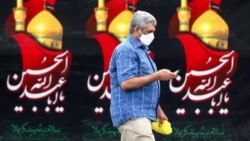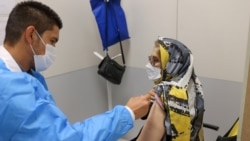As Iran struggled with a new wave of COVID-19 infections, an official close to Supreme Leader Ali Khamenei on August 25 made a puzzling statement.
“The leader of the revolution has not yet banned a specific vaccine,” said Mehdi Fazaeli, a member of an office responsible for publishing Khamenei's works.
“From the beginning, they insisted on buying vaccines safely, and for some reason they did not consider buying from the United States, Britain and France safe,” he said.
But that is false.
In fact, Khamenei banned U.S. and U.K. vaccine imports in January, falsely claiming Western countries wanted to test their vaccines on Iranians.
Moreover, in a televised speech earlier this year, he specifically mentioned the Pfizer-BioNTech vaccine from the U.S., saying: “If their Pfizer company can produce vaccines, why don’t they use it themselves so that they don’t have so many dead? The same applies to Britain.”
Khamenei’s ban was tweeted on his official Twitter account: “It is not unlikely they would want to contaminate other nations,” the tweet said. “Given our experience with France’s HIV-tainted blood supplied, French vaccines aren’t trustworthy either.”
Fazaeli’s latest comments came as Iranian officials face harsh criticism for mismanaging their COVID-19 vaccine efforts. Since June, Iran has been hit by an overwhelming fifth wave of the coronavirus, spurred by the highly contagious delta variant.
Daily confirmed cases hit a peak of nearly 40,000 on August 17, according to the tracking site Our World in Data. In late August, deaths per day hit a record of more than 600.
Along with the United States, Kazakhstan, Mongolia and Botswana, Iran has experienced one of the highest biweekly rates of COVID-19 cases per capita in the world.
As of August 30, Iran had registered an estimated 4.9 million COVID-19 cases, with more than 100,000 deaths. But local sources say the toll is higher.
Fazaeli also said that if the same COVID-19 vaccines came from countries other than the United States and Britain, it would be acceptable to use them in Iran.
At the start of the pandemic in March 2020, the U.S. offered Iran assistance in battling COVID-19. Khamenei refused the offer, citing the false conspiracy theory that the virus was engineered in a U.S. lab.
Twitter later took down the supreme leader’s tweets about banning Western vaccines because they violated the social media platform’s rules. On December 2020, Twitter issued a new policy banning “harmfully false or misleading narratives about COVID-19 vaccinations.”
Khamenei falsely alleged that the virus was “specifically built for Iran using the genetic data of Iranians which they have obtained through different means.”
Other Iranian officials have repeated his false claim that U.S. vaccines are man-made biological weapons.
On August 22, Major General Hossein Salami, commander-in-chief of Iran’s Islamic Revolutionary Guard Corps (IRGC), reiterated that conspiracy theory, claiming “the enemy” is using biological weapons to paralyze Iranians.
“Due to absolute distrust, we cannot trust the enemies and allow them to inject the vaccine solution into the bodies of our people, because we know that in the enemy’s strategy, paralyzing the Iranian people is a definite goal,” Salami said.
Iranian state-run media has also spread disinformation accusing the U.S. of sending contaminated vaccines to Japan.
On June 17, the U.S. issued new guidance for delivering medical supplies like masks, ventilators and vaccines to fight COVID-19 in sanctioned countries like Iran, Venezuela and Syria. Iran remains under U.S. sanctions for its nuclear program.
The guidance also permits bank transactions and activities in Iran’s Central Bank and national oil company related to fighting the pandemic.
In an attempt to find an alternative to Western vaccines, Iran announced it would collaborate with Russia and Cuba to manufacture a COVID-19 vaccine. That plan did not materialize, and Iranian officials have fallen short on promises to vaccinate millions.
Iran opted to produce its own vaccine, the COVIran Barekat, but it has not yet reached the mass production phase.
The Iranian government claims that it has vaccinated 3.5 million of the country’s 80 million people, and has imported over 21 million vaccine doses, mostly through China, Russia and India.
Iran has faced a severe vaccine shortage since vaccine shipments from China and Russia halted as Beijing, Moscow and New Delhi were unable to keep up with vaccine deliveries due to high demand, according to Alireza Nadji, the head of virology center at Tehran’s Beheshti University.
On August 19, the New York-based group Human Rights Watch (HRW) said government mismanagement made the pandemic worse.
“Iranian officials have blamed sanctions and delays in importing vaccines, as well as each other, for the slow roll out of the vaccination problem, without providing clear evidence of their claims,” HRW said.







